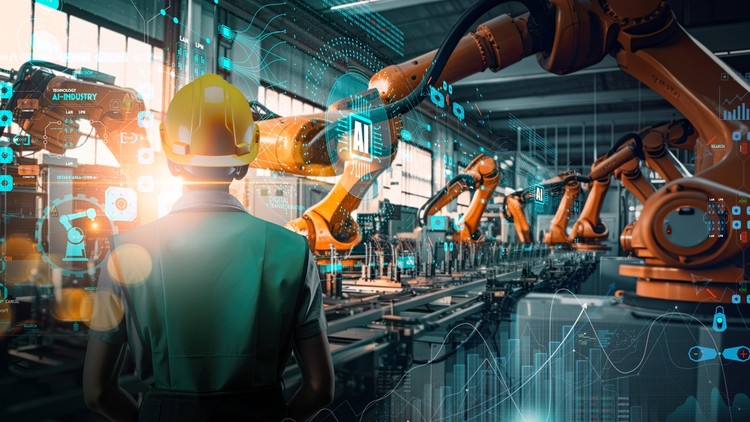
Industry 4.0 II Cutting-Edge Innovations for the Smart Factory
Why take this course?
🤖 Course Title: Industry 4.0 II: Advanced Manufacturing Technologies
🎉 Course Headline: Industry 4.0 II Cutting-Edge Innovations for the Smart Factory
🚀 Dive into the Future of Manufacturing!
Course Description:
Embark on a transformative learning journey with “Industry 4.0 II: Advanced Manufacturing Technologies,” where we unravel the intricacies of smart factory technologies and innovations that are reshaping the manufacturing landscape. This comprehensive course is meticulously designed for industry professionals, engineers, and tech enthusiasts eager to navigate through the complex world of Industry 4.0.
What You’ll Discover in This Course:
🖨️ Additive Manufacturing (3D Printing): Get an in-depth understanding of how AM technologies are reshaping design and production processes, and learn about the latest advancements in both metal-based systems like Selective Laser Melting (SLM) and polymer-based techniques such as Fused Deposition Modeling (FDM).
⚫️ Smart Materials & Sensor Technology: Explore the integration of smart materials equipped with embedded sensors that monitor conditions in real-time, enhancing safety and efficiency.
🔧 Computer Numerical Control (CNC) Systems: Discover how CNC systems are evolving with IoT integration, enabling more intelligent and automated operations, including toolpath generation.
🤖 Collaborative Robots (Cobots) & Autonomous Mobile Robots (AMRs): Dive into the role of cobots and AMRs in optimizing efficiency across various manufacturing processes, from assembly to material handling.
👀 Augmented Reality (AR)/Virtual Reality (VR): Learn how AR/VR tools are revolutionizing product design, maintenance, and testing by providing immersive experiences that enhance productivity and safety.
🎨 Human-Machine Interfaces (HMIs): Examine the evolution of HMIs, from touchscreens and voice controls to pioneering wearables and brain-computer interfaces (BCIs), which are at the forefront of human-technology interaction.
Why Take This Course?
✅ Stay Current: The manufacturing landscape is rapidly changing. Keep abreast of the latest trends and technologies that will shape Industry 4.0.
✅ Boost Your Skills: Acquire in-depth knowledge of advanced technologies that will give you a competitive edge in the smart factory revolution.
✅ Join the Community: Engage with fellow professionals, share insights, and participate in discussions that drive innovation in manufacturing.
✅ Future-Proof Your Career: Prepare for the future job market by familiarizing yourself with the tools and technologies that are defining tomorrow’s industry.
This is the second course in the 3-part series on Industry 4.0, offering a seamless continuation from where we left off in “Industry 4.0 I: Introduction to Smart Manufacturing.” By completing this trilogy, you will not only gain comprehensive knowledge of both the foundational and advanced aspects of Industry 4.0 but also be equipped with practical insights that are indispensable for a successful career in the smart factory ecosystem.
Enroll now and step into the world of smarter manufacturing! 🎓✨
- Mastering Industrial AI & Machine Learning: Implement advanced artificial intelligence algorithms and machine learning models for predictive maintenance, quality control, anomaly detection, and autonomous decision-making across complex manufacturing operations.
- Deep Dive into Digital Twin Implementation: Develop and deploy sophisticated digital twins for real-time simulation, performance optimization, and lifecycle management of products, production lines, and entire factory ecosystems, moving beyond conceptual understanding.
- Advanced Robotics & Collaborative Systems: Explore the architecture, programming, and safety protocols for next-generation collaborative robots (cobots), autonomous mobile robots (AMRs), and human-robot interaction strategies to enhance flexibility and efficiency in smart factories.
- Industrial IoT & Edge Computing Architectures: Design, secure, and manage scalable Industrial Internet of Things (IIoT) networks, leveraging edge computing paradigms for ultra-low latency data processing, real-time control, and decentralized intelligence at the plant floor.
- Additive Manufacturing for Mass Customization: Understand advanced additive manufacturing techniques, including multi-material printing, large-scale systems, and their integration into production workflows for rapid prototyping, on-demand manufacturing, and personalized product creation.
- Blockchain for Supply Chain Transparency: Apply distributed ledger technologies (blockchain) to establish immutable records for enhanced traceability, authenticity verification, and secure data exchange across intricate global manufacturing supply chains.
- Augmented Reality & Virtual Reality in Operations: Utilize AR/VR technologies for immersive training, remote assistance, enhanced maintenance procedures, virtual prototyping, and improved operational visualization within the smart factory environment.
- Big Data Analytics for Manufacturing Intelligence: Employ advanced statistical methods and data visualization tools to extract actionable insights from vast datasets generated by connected machinery, optimizing production schedules, resource allocation, and energy consumption.
- Cyber-Physical System Integration & Security: Address the intricacies of converging IT and Operational Technology (OT) systems, focusing on robust cybersecurity frameworks, threat detection, and resilience strategies tailored for industrial control systems and critical infrastructure.
- Sustainable Manufacturing & Circular Economy: Investigate how Industry 4.0 technologies facilitate resource efficiency, waste reduction, carbon footprint minimization, and the implementation of circular economy principles throughout the product lifecycle.
- Human-Centric Automation & Workforce Transformation: Analyze the evolving role of human operators alongside intelligent systems, focusing on human-machine interfaces, upskilling initiatives, ergonomic design, and fostering a collaborative workforce in advanced manufacturing.
- Strategic Implementation & Business Model Innovation: Formulate strategies for the successful adoption of Industry 4.0 technologies, conduct return on investment (ROI) assessments, and explore new business models driven by digital transformation in the manufacturing sector.
- PROS:
- Future-Proof Skills: Equips learners with highly sought-after expertise in the rapidly evolving landscape of advanced manufacturing and industrial digitalization.
- Hands-on Application: Focuses on practical implementation and real-world scenarios, preparing individuals for immediate impact in smart factory environments.
- Strategic & Technical Depth: Offers a comprehensive understanding that spans both the technical intricacies of new technologies and their strategic business implications.
- Interdisciplinary Exposure: Bridges gaps between engineering, computer science, data analytics, and operations management, fostering a holistic perspective.
- Career Advancement: Positions graduates for leadership roles in innovation, R&D, operations management, and digital transformation within global industries.
- CONS:
- Requires Foundational Knowledge: As an ‘II’ level course, it may necessitate a strong prerequisite understanding of core Industry 4.0 concepts and related engineering principles to fully grasp the advanced topics.